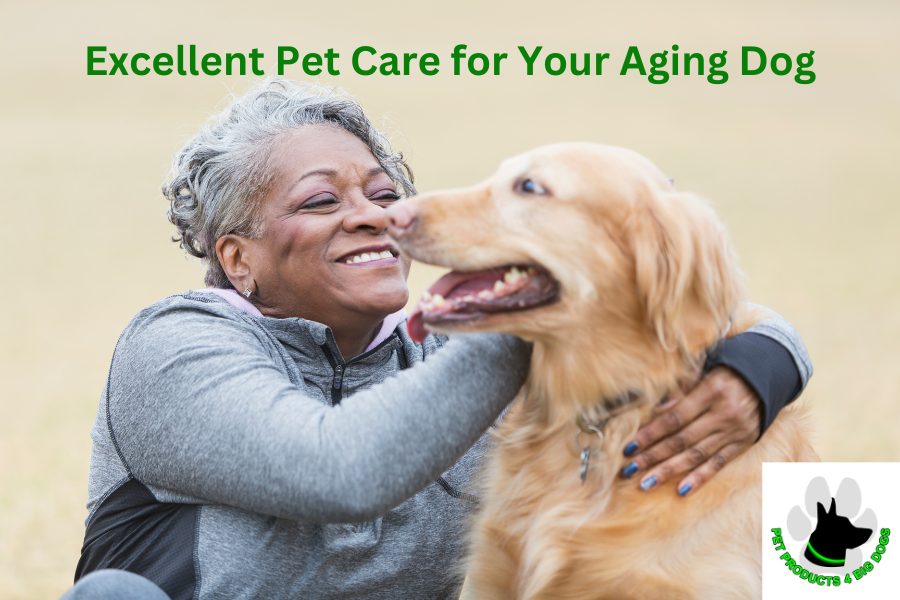We love our big dogs, so it’s beyond being a responsibility to give our furry friends the best care possible; it’s something we want to do! A dog gives their heart to us for their entire life; the only problem is that life is relatively short – so as a dog is getting older, our duty and desire is to give them the best care possible and provide them with the care and support and love they need during this stage of their lives. Whilst these tips are suitable for any sized dog, in this article, I’m going to focus on the larger dog. Caesar is my inspiration. As their muzzles grey, and perhaps their eyes become a little cloudy and they just don’t have the pounce they once did, they may still have some good years – so let’s give them the best life possible.
Tips for Caring for an Aging Dog, Especially a Larger Old Dog
1. Visit the Vet Regularly
Regular veterinary check-ups are essential for aging dogs, as various health issues can arise with age. Make sure you schedule regular appointments with your vet to monitor your dog's overall health and to address any potential concerns as they come up. Early detection of health issues can be crucial in providing timely treatment and keeping your big dog comfortable.
2. Provide a Balanced Diet
Nutrition plays a vital role in maintaining your aging dog's health. As dogs age, their dietary needs change (just like humans to a degree), so it is essential to choose a high-quality senior dog food formulated for their specific requirements. Senior dog foods are lower in calories and higher in nutrients to support your dog's aging body. Research some great options, or consult your vet to determine the optimal diet for your aging dog, taking into consideration their size, breed, and any specific health conditions they may have. You may also select to add supplements to their diet; again, liaise with your vet first.
3. Maintain a Healthy Weight
Obesity can have a detrimental impact on your aging dog's health, particularly in larger breeds. Excess weight can put additional strain on their joints and lead to a range of health issues such as arthritis, diabetes, and heart disease. Monitor your dog's weight regularly and adjust their diet accordingly. I know with Caesar, he started to put on a few extra pounds (hey, I could relate to that) and it got to a point the vet said he’s just a little over optimum weight; so we went on a diet. I didn’t cut out everything, but the treats and snacks became a little less frequent and definitely smaller in portion size. Instead of a whole slice of cheese (his favourite) it became a piece of a cheese slice. Yes, I know they look at your with those big brown eyes, but stay strong, it’s for their long-term wellness.
4. Provide Regular Exercise
While exercise is important for dogs of all ages, it becomes even more important for aging dogs. Regular physical activity can help to keep their muscles toned, joints limber, and maintain a healthy weight. However, older dogs may not have the same endurance or energy levels as they used to, so it is important to tailor the exercise routine to their capabilities and current health conditions. Engage in low-impact activities such as gentle walks, swimming, or even short play sessions to keep your aging dog active and happy. By the way, that exercise is good for you too. : )
5. Manage Joint and Mobility Issues
As dogs age, joint problems and mobility issues become more common, especially in larger breeds. You can help ease their discomfort by providing orthopedic bedding like the one we sell. As Caesar was aging, I could see that the cheapo beds out there were useless when it came to support. Try lying on your dog’s bed and see how much padding it has. I’m so glad I got him his bed when I did. He had done his ACL, has joint problems and the beginning of arthritis; I know his bed was an awesome choice; that’s why I sell it.
6. Pay Attention to Dental Health
Dental health is often overlooked but also very important for overall well-being. As dogs age, they are more prone to dental issues such as plaque buildup, gum diseases, and tooth decay. Regular teeth brushing and veterinary dental cleanings can help prevent these issues and keep your dog's mouth healthy. Chew toys and dental treats can also assist in maintaining their dental hygiene.
7. Provide Mental Stimulation
Keeping your aging dog mentally stimulated is equally important as physical exercise. Engage their minds with interactive toys, puzzle feeders, and simple training exercises. Mental stimulation helps to prevent cognitive decline and keeps your dog's brain active and healthy. Refreshing on dog training, asking for some ‘tricks’ to have dinner are stimulating; they love that mental stimulation and of course you’re cheerful and excited “good boy” gives them a sense of achievement.
8. Create a Comfortable Environment
Make sure your home environment is comfortable and safe for your aging dog. Provide them with a quiet place they can rest undisturbed – especially if you’ve younger children or a pup. Consider placing rugs or carpets on slippery surfaces to prevent joint injuries and especially at their food bowls where they stand that bit longer. You may find they drink a little more, so ensure you keep the water up, and yes, keep an eye on the amount they drink. Speaking of drinking, that was another reason I got the tall water bowls because it meant that our ‘big boys’ didn’t have to bend over too far to have a drink, plus lots of other reasons – it’s all about their comfort and wellbeing.
9. Be Observant and Adjust as Necessary
As your dog ages, they may experience changes in their behavior, appetite, or mobility. It’s important to be observant and pay attention to these changes. Any sudden weight loss or gain, difficulty in movements, excessive thirst, or changes in bathroom habits could be signs of underlying health issues. Alert your vet about any changes you observe to address potential problems promptly and ensure your dog's comfort. Your adjustments may also be a little more subtle. Whilst a walk to a certain point was easy before, you may have to shorten the distance a little if s/he is ‘flagging’ towards the end of the way back. Plan the trips; whatever you walk to, they need to walk back. It’s not like a little dog you can pick up and carry the rest of the way home.
10. Consider Acupuncture or Massage Therapy
Alternative therapies such as acupuncture or massage therapy can be beneficial for managing pain and improving mobility in aging dogs. If you’re in the Redlands, ask me, I know a lovely lady who does amazing canine remedial therapy.
11. Adapt Your Home for Safety
As your dog ages, they may lose their vision or hearing, making it important to adapt your home for their safety. Remove potential hazards, such as sharp objects and consider using baby gates to limit their access to areas, like stairs. It’s funny, I’ve not had much luck with ramps, but a few extra bricks at the back door worked really well.
12. Give them Extra Love and Attention
Last but certainly not least, this is a must: Your senior dogs need extra love and attention during their golden years. Spend quality time with your aging dog, cuddle with them, and provide plenty of affection. Older dogs often appreciate attention and companionship more than ever and thrive in a loving and caring environment. They deserve it. 😊

